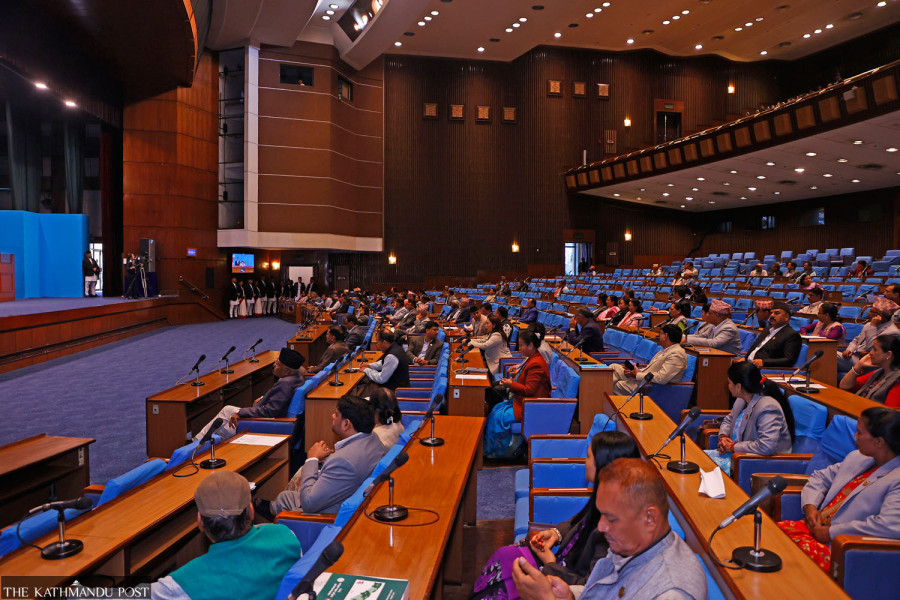Politics
Now PM holds the key to constitutional appointments
New Constitutional Council law allows even two council members including the prime minister to make decisions.
Binod Ghimire
The federal parliament has endorsed a bill to amend the Constitutional Council (Functions, Duties, Powers and Procedures) Act with a provision for the prime minister and a majority of available members of the council to make decisions.
The House of Representatives endorsed the bill accepting the feedback from the National Assembly which had set four conditions for convening the council’s meetings and making decisions.
In the first scenario, when the council has the chairperson and five members, the quorum for the meeting is deemed to have been achieved if the chair and any three members are present. The four can make nominations for appointments to vacant positions in constitutional bodies.
In the second scenario, when the chairperson and four members are in office, a minimum of three, including the chairperson and at least two members, can make decisions. In the third scenario, when the council has four members including the chairperson, three of them including the prime minister can make decisions.
In the fourth scenario, when the chairperson and two members are in office, a quorum is considered met if at least two, including the chairperson and at least one member, are present. In such an extreme case, only two including the prime minister and one member can make decisions or nominations.
As per the Constitution of Nepal, the council is headed by the prime minister. The chief justice, Speaker of the House, National Assembly chair, leader of the main opposition and deputy Speaker are its members. The Minister for Law, Justice and Parliamentary Affairs takes the seat when the council is to nominate a candidate for chief justice.
The Pushpa Kamal Dahal government in February 2023 had registered the amendment bill proposing that the six-member council nominate office-bearer candidates for constitutional bodies with the approval of its chairperson and at least half of the existing members—or four members in total. It made the prime minister’s consent a must.
Before this (or before the 2020 ordinance), decisions required consensus among the prime minister and at least four or five other members, and there was no provision of majority-based decisions. The new amendment introduces the four scenarios, where decisions can be made by a majority of the members present, but only with the prime minister’s consent.
Initially, the CPN-UML had objected to the bill arguing that a majority of the council including the chairperson should make decisions. However, after the UML backtracked, the bill was endorsed without changes by the State Affairs and Good Governance Committee of the House of Representatives in May last year.
The National Assembly endorsed the bill without revising it in principle but adding the four different scenarios. It was accepted by the lower house on Wednesday. Currently, the chairperson and four members of the council must be present to convene its meeting. However, a majority of the present members can take the decision if there is no unanimity.
When the President authenticates the bill, the prime minister’s consent will be necessary, including an agreement between 50 percent of the remaining members, for the decision.
In the six-member council headed by Prime Minister KP Sharma Oli, National Assembly Chairman Narayan Dahal comes from the CPN (Maoist Centre), while Speaker Devraj Ghimire and deputy Speaker Indira Rana were elected under the UML and Rastriya Swatantra Party quotas, respectively. Pushpa Kamal Dahal is the leader of the opposition.
As per the bill, each member of the council should be informed about the meeting 48 hours in advance, and a member will have to inform before 24 hours if they cannot participate.
In addition to the chief justice, the council has the authority to nominate chairpersons and members of various constitutional bodies.
The then Oli-led government had in December 2020 revised the Act through an ordinance, making it possible for the chairperson and two members to make nominations. As many as 52 persons were appointed chairpersons and members of various constitutional bodies based on the recommendations of the Oli-led council while Ganesh Timilsina, then chair of the upper house, and then chief justice Cholendra Shumsher Rana lent their support.
But Agni Sapkota, then Speaker and Deuba, then leader of the opposition, had skipped the meeting. Though the appointments have been upheld by the top court, the Act needed to be revised to revive the provisions that remained void after the Oli government withdrew the ordinance.
Around a dozen constitutional positions including five chairs remain vacant. The Election Commission, the National Women Commission, the Madheshi Commission, the Tharu Commission and the Muslim Commission are without chairs.




 10.97°C Kathmandu
10.97°C Kathmandu













